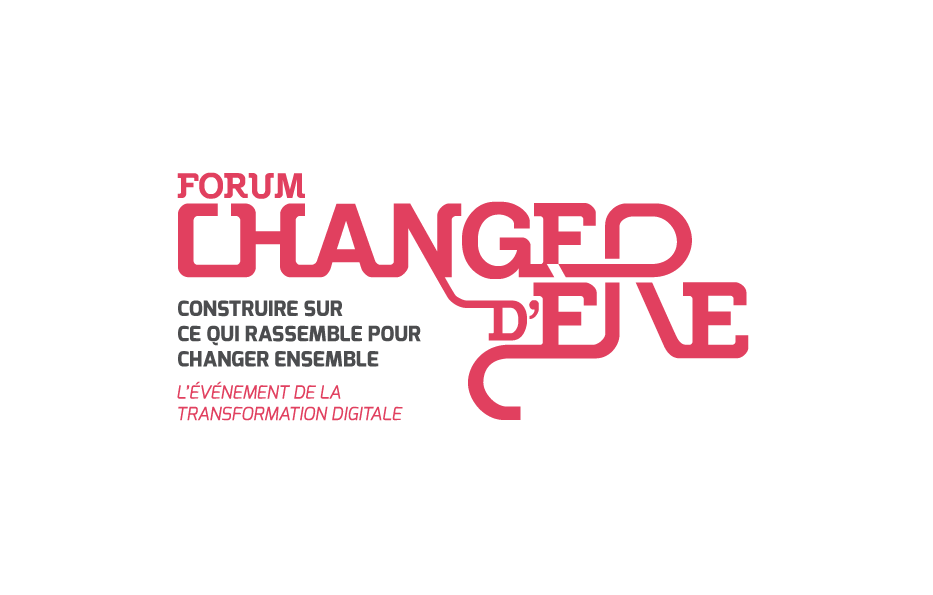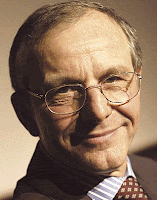Véronique Anger: What is your opinion about genomes when confronted with the new revolutionary theories in developed biology and especially that of « no God, no gene, for another theory of heredity » from Jean-Jacques Kupiec and Pierre Sonigo**? Do you think determinist genetics is over?
Les Di@logues Stratégiques (01/02)
Professor Axel Kahn* is a geneticist, a doctor and the head of the department specialized in genetics, molecular development and pathology at L’institut Cochin de génétique moléculaire.
As a humanist, a committed scientist, a member of the French ethical advisory Committee, the President of the experts’ group in Life Sciences at the European Commission, Axel Kahn questions himself and encourages us to reflect about the ethical aspects of scientific progress, and especially concerning genetics.
Its popular scientific works are greatly successful among the general public. Its last book** « L’avenir n’est pas écrit »(Future is not written) deals with possible scientific excesses.
Professor Axel Kahn: It is quite obvious that genetics can’t be totally determinist.
Personally, I am strongly against the theory of ultra-genetic determinism and the Dawkins theory of « the egoistic gene« (1).
Since Darwin‘s Evolution theory, several exegesis and new versions of it have been presented. One of them is quite similar to the genetic ultra-determinism theory. Above all, it takes up the following Dawkins theory: « evolution is only the result of genes that compete to be promoted », which means that cells would be kinds of amplification-based mechanisms inside which genes compete fiercely.
The Kupiec and Sonigo theory consists in replacing the egoistic gene by « the egoistic cell »: cells are in competition. There is no selection from organisms themselves. Organisms are only the result of an egoistic competition between cells, at an elementary level.
In fact, the Kupiec theory is far more exaggerated and inadmissible than the theory of the egoistic gene. Kupiec proposes another vision -totally ideological I think- which replaces a determinism only genetic by a determinism only cellular, which means that there is no selection among animals and organisms, since they are the results of cellular egoism.
To show you how it is exaggerated, I give you an example. When two organisms have the same genome (as everybody knows, it’s the case for all monozygotic twins), whatever be the cellular independence and the uncertainty of the embryonic development, the organisms resulting from these two embryos with the same genome are « identical twins », i.e. they look like each other. This example shows that you cannot study biology without accepting the theory of genetic determinism…
I think that truth is between these two extremities. There is actually a genetic determinism: genes determine proteins, and proteins come into play in the composition of cells. But this determinism is linked to certain cellular properties, and a kind of competition between cells is possible, for example during the embryogenesis(2).
For my part, I support Darwin’s theory: selection is generally made among organisms. Organisms are subject to a kind of determinism and to cellular sociology phenomena, as well. This is why biology is so complex.
I think that both the Dawkins egoistic gene thesis and the Kupiec and Sonigo egoistic cell thesis have a theological and excessive dimension.
VA: In last November, the announcement from the Massachusetts ACT laboratory of an experimented cloning of a human embryo for therapeutic purposes caused controversy. As a member of the ethical advisory Committee, and as a human being as well, what is your point of view: Must these experiments be prohibited or encouraged?
Prof. AK: This Advanced Cells Technology’s announcement is nonsense …In fact, this experiment is likely to fail. For ten years, experiments aiming at obtaining cloned embryos have been quite numerous. The University of Saint Louis (USA) pretended to obtain four-celled cloned embryos through a transfer of nucleus(3). A bit later, the spotlight was on Korean researchers.
But this time, after ten years of efforts, ACT asserts to have obtained six-celled embryos (the result of sixty attempts or so). These cloned embryos stopped growing only twenty-four hours after the division started(4).
This has proved that nobody is currently able to clone a human embryo, or primates’ embryos either. Indeed, we had already noted such difficulties with monkeys. And even today, we don’t know why and we are still unable to get over them, which doesn’t mean that we’ll never find the solution …
But, from the ethical point of view, I’m totally opposed -for some reasons- to the legitimisation of the cloning-based reproduction of human beings.
This authorisation would entitle some individuals to create human beings in their own image… This kind of subjection -even though it is only corporal- is intolerable. What could give somebody the right to choose the sex, the eyes’ or hair’s colour, the chin’s shape or any other characteristic of a human being? As a consequence, I see no reason for legitimating reproductive cloning. As regards therapeutic cloning, a problem can be pointed out: before making a supposedly therapeutic cloning, a human-cloning technique must be found.
Besides, when you have a closer look at it, therapeutic cloning is not credible at all.
Just imagine that I were a victim of a myocardial infarction or of an Alzheimer or Parkinson disease and that I wanted to be treated by therapeutic cloning. What would happen?
First of all, a piece of my skin would be taken and grown. Then, you would try to get hundreds of ova on the market. Quite obviously, the conditions in which we would get them would confront us with an ethical problem. Indeed, they might give rise to traffic in women’s ova.
Then, these cells’ nucleases would have to be exchanged with my cutaneous cultivated cells. The results are very uncertain since the technique is not mastered yet. Just imagine that one succeeded in obtaining an embryo that he or she would try to develop till six days.
Finally, a few cells would be taken and cultivated. Then, you would have to command them to shift into heart cells (to treat my infarction) or into brain cells (for Alzheimer or Parkinson diseases).
This demonstration perfectly shows the unrealism of such a project. I might have died hundreds of times before the efforts eventually gave results!
Even though one manages to do it one day, for a chronic disease for example, this technique is undoubtedly egoistic and it requires a lot of time, efforts and money. Furthermore, only privileged rich people could afford to pay for the services of an entire team of biologists for several months…
In addition to moral objections, medical indications and a real lack of realism, I see nothing that could legitimise research on therapeutic cloning in public laboratories.
VA: The human genome sequencing is nearly finished. In « L’avenir n’est pas écrit »(« Future is not written »), your latest book, you write: « One century at least is necessary in this field of research (i.e. to pass from genes’ primary sequence to the understanding of their functions). Considering the impressive progress in computing, are we likely to wait so many years for understanding the meaning of genetic alphabet? (For example, the sequencing has been carried out much more quickly than expected)
Prof. AK: Whatever some people may think, the best metaphor of the « genome » programme and genetic determinism is a genetic alphabet-based language (4 letters instead of the usual 26 of Latin alphabet).
The smallest meaningful group of our alphabet’s letters is called a word. The smallest meaningful group of genetic letters is called a gene.
A word’s meaning totally depends on context: it definitely depends on the sentence and its context. It’s the same thing for a gene; its meaning is linked to the other genes and their context.
The level of genetic research we have reached so far is the base of a dictionary that includes a series of words (or genes) with their first definitions.
Obviously, when you have a dictionary at your disposal, you don’t have written yet « In Search of Time Lost », Poems by René Char or Victor Hugo …
A « genetic dictionary » only helps to do biology; it doesn’t summarize biology. The genome sequencing has offered new prospects and means. That’s why I’ve said that we are only at the beginning of the story.
VA: You are in charge of the « L’homme et les gènes » exhibition which will be presented from May at « La Cité des Sciences et de l’Industrie » of La Villette. The theme of this exhibition will be « issues and limits of mankind’s knowledge through sciences »(I quote you). What are the main agents of your exhibition? And what are the limits you’ve referred to?
Prof. AK: The theme of this exhibition is the result of deep personal reflection. Man, result of an evolution, is composed of stardust and matter. This matter, which had shifted into life, progressively got consciousness. This is how man appeared. Man pretends to be free because of neurobiological and cognitive features he has gained. Mankind’s consciousness and their cognitive abilities have encouraged them to wonder about their material origins (as avatars of their evolution) and responsibilities. So human beings are now able to reflect and store up much knowledge. But this knowledge doesn’t explain them -because they are free- how to use such powerful information.
The question of responsibility is to the heart of the anthropologic reality of our race. Through the exhibition, I will try to paint the picture of mankind « from the matter to life and consciousness ». A kind of consciousness that comes back to mankind’s origins and enlightens the human problem, i.e. the responsibility of a being free to use its powers in aid or to the detriment of the world and mankind.
(1) In « Le gène égoïste » (78), the English sociobiologist Richard Dawkins presents a new interpretation of Darwin competition. He thinks that this competition is not between species or organisms, but between DNA and RNA molecules, which compose genes. In other words, genes compete through organisms and do not hesitate to sacrifice organisms to survive if it is requires by natural selection. Since then, Dawkins has explained in « Les mystères de l’arc-en-ciel » » that genes (excluding bacteria and viruses) work both egoistically and ‘collectively’ for their own survival, in the complex genome world.
(2) Embryogenese or embryogeny: birth and development of an animal or vegetal organism in the embryo phase.
(3) In last November, Advanced Cells Technology, a laboratory in Massachusetts, pretended to have managed to make the first human cloning in order to produce cloned cells for the treatment of incurable diseases. This cloning is identical to the technique that was used by PPL Therapeutics’ team to give birth to the sheep Dolly in 1997(i.e. introducing the nucleus of a cell that has been taken from a mature organism into an enucleated oocyte). According to ACT biologists, three embryos would have developed till the 6-celled phase. The experiment’s purpose was to « cultivate » cloned cells so as to create human tissues that could be transplanted without risks of rejection (the tissues belonging to patients).
(4) An embryo is defined as a growing organism, from the state of egg or zygote (resulting from the fertilization of an ovule by a spermatozoon) till an autonomous organism. Human embryos that are over three months are called foetuses.
*Professor Axel Kahn has written hundreds of scientific articles in the specialized and popular press. He has also written: « Et l’homme dans tout ça? Plaidoyer pour un humanisme moderne » (Nil Eds. 2000); « Copies conformes. Le clonage en question » with the collaboration of Fabrice Papillon (Nil Eds. 1998) or « la médecine du XXIème siècle. Des gènes et des hommes » (Bayard. 1996).
**In « L’avenir n’est pas écrit » (Bayard. 2001), the journalist Fabrice Papillon leads the debate between Prof. Axel Kahn and Albert Jacquard about current big ethical, philosophical and scientific questions. Biographie (in French) by Prof. Axel Kahn.
**See recent initerview (February 05) of Jean-Jacques Kupiec with the physician Bertrand Laforge : http://www.vivantinfo.com/numero9/hasard_selection.html
For further information:
About human genome: http://www.genoscope.cns.fr/externe/Francais/Questions/
About « the egoistic gene »: http://www.admiroutes.asso.fr/larevue/2000/4/mondememe.htm
« L’homme et les gènes » at La Cité des Sciences: http://www.cite-sciences.fr/francais/ala_cite/expo/tempo/defis/homgen/index.htm
Other sites: http://www.cite-sciences.fr/francais/ala_cite/expo/tempo/defis/encyclobio/index.htm
And L’Université de tous les savoirs: http://www.canal-u.education.fr ethttp://www.lacinquieme.fr/concepts/W00081/7/26386.cfm
Professor Axel Kahn ; « Futur is not written »
Comments 0
- Les Di@logues Strategiques on 2 mai 2010 inLes Di@logues Strategiques
Non classé



